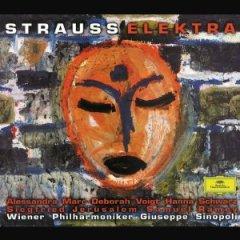Richard Strauss - Elektra (Sinopoli) [1997]
Richard Strauss - Elektra (Sinopoli) [1997]

CD1 1. R. Strauss: Elektra, Op.58 - "Wo bleibt Elektra?" Annette Jahns 6:08 2. R. Strauss: Elektra, Op.58 - "Allein! Weh, ganz allein." Alessandra Marc 9:31 3. R. Strauss: Elektra, Op.58 - Ah! das Gesicht! Alessandra Marc 10:11 4. R. Strauss: Elektra, Op.58 - "Was willst du? Seht doch dort!" Christiane Hossfeld 10:44 5. R. Strauss: Elektra, Op.58 - "Ich habe keine guten Nächte." Alessandra Marc 15:03 CD2 1. R. Strauss: Elektra, Op.58 - "Orest! Orest ist tot!" Walter Zeh 11:21 2. R. Strauss: Elektra, Op.58 - "Nun denn, allein!" Samuel Ramey 11:35 3. R. Strauss: Elektra, Op.58 - Orest! Orest! Es rührt sich niemand! Goran Simic 12:34 4. R. Strauss: Elektra, Op.58 - Es muss etwas geschehen sein Siegfried Jerusalem 6:17 5. R. Strauss: Elektra, Op.58 - "Elektra! Schwester!" Konzertvereinigung Wiener Staatsopernchor 9:50 Elektra - Alessandra Marc Chrysothemis - Deborah Voigt Clytemnestra - Hanna Schwarz Aegisth - Siegfried Jerusalem Orest - Samuel Ramey Ein alter Diener - Walter Zeh Ein junger Diener - Michael Howard Die Schleppträgerin - Karin Wieser Die Vertraute - Christiane Hossfeld Der Pfleger des Orest - Goran Simic Die Aufseherin - Helga Termer 1. Magd - Annette Jahns 2. Magd - Gabriele Sima 3. Magd - Elisabeth Wilke 4. Magd - Anne Schwanewilms 5. Magd - Katerina Beranova Wiener Philharmoniker Giuseppe Sinopoli – conductor, 1996
Coming immediately after his one-act shocker, Salome (1905), Elektra (1909) took Richard Strauss further into a musical world that stood in bleak contrast to nineteenth century Romantic opera. This tale of multiple murder and bitter vengeance also proved crucial to Strauss' later development as a composer of opera, since it marked the beginning of his collaboration with the young Viennese poet Hugo von Hofmannsthal, whose German translation of Sophocles' Greek tragedy originally inspired Strauss to take up the subject, and with whom he would craft his most lasting masterpieces.
The story is simple. Elektra is mourning the death of her father Agamemnon, murdered by her mother, Klytemnestra. She tries to persuade her sister Chrysothemis to help her avenge his death. Their brother Orestes, whom they feared dead, returns home and is persuaded to kill both Klytemnestra and her lover, Aegisthus. ("Very unlike" -- as one English nobleman is supposed to have remarked after seeing the opera -- "the home life of our own dear Queen.")
As with his setting of Oscar Wilde's Salome, Strauss' Elektra is not merely an adaptation for musical purposes, but a "play set to music." As in Sophocles' original, the climax of the opera is not the murder of Klytemnestra and Aegisthus, but the tense relationship that develops between Elektra and Orestes as she incites him to action.
Strauss always favored the soprano voice and, in a cast of 14, indulged himself in no fewer than six, in both major and minor roles. The subliminal effect of this high tessitura, together with lavish orchestration and a certain amount of atonality, is to intensify the psychological conflicts that emerge as Elektra pursues her vengeful plan. "The struggle between words and music has been the problem of my life right from the beginning" wrote Strauss in a letter to the famous Wagner singer Ernestine Schumann-Heink, who sang Klytemnestra at the first performance. If Elektra wins that hidden struggle it is through the sheer power and conviction of the music.
Aside from their somewhat scandalous subject matter, there are few similarities between Elektra and Salome. As von Hofmannsthal wrote, "In Salome much is, so to speak, in purple and violet. In Elektra...it is a mixture of night and light, or black and bright." The events leading up to Orestes' deed are not matched by anything corresponding, or even faintly similar, to those in Salome and lead to "victory and purification -- a sequence I can imagine as being much more powerful in music than in the written word."
The first night was not a success. The critic Julius Korngold sarcastically wrote "How beautiful was the Princess Salome tonight!" Strauss riposted "When a mother is slain on stage do they expect me to write a violin concerto?" Following its presentation at Covent Garden the English critic Bernard Newman wrote of "a strain of coarseness and thoughtlessness" in Strauss which persuaded him to "take up so crude a perversion of the old Greek story as that of Hugo von Hofmannsthal," and Bernard Shaw asked "Is there [anywhere] such an atmosphere of malignant and cancerous evil as we get here?" Inexplicably the first New York performance in 1932 was in French.
Yet in many ways Elektra is Strauss' most successful opera, though not his most popular. Its one-act structure leads to a concise, relentless and fast-developing drama of a sort not conspicuous in the composer's more Romantic works. --- Roy Brewer, Rovi
download: uploaded yandex 4shared mediafire solidfiles mega zalivalka filecloudio anonfiles oboom
Zmieniony (Sobota, 17 Maj 2014 21:59)








